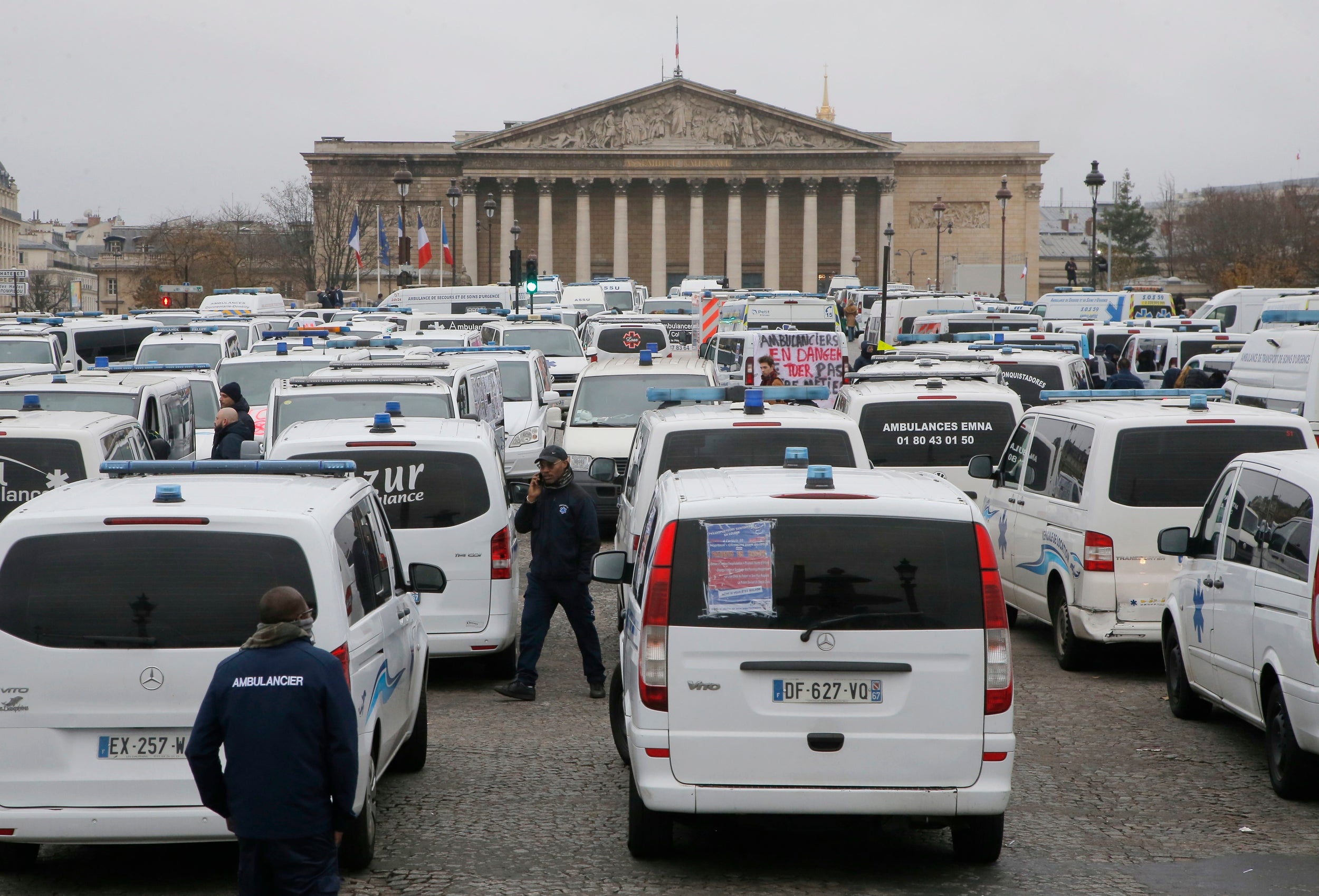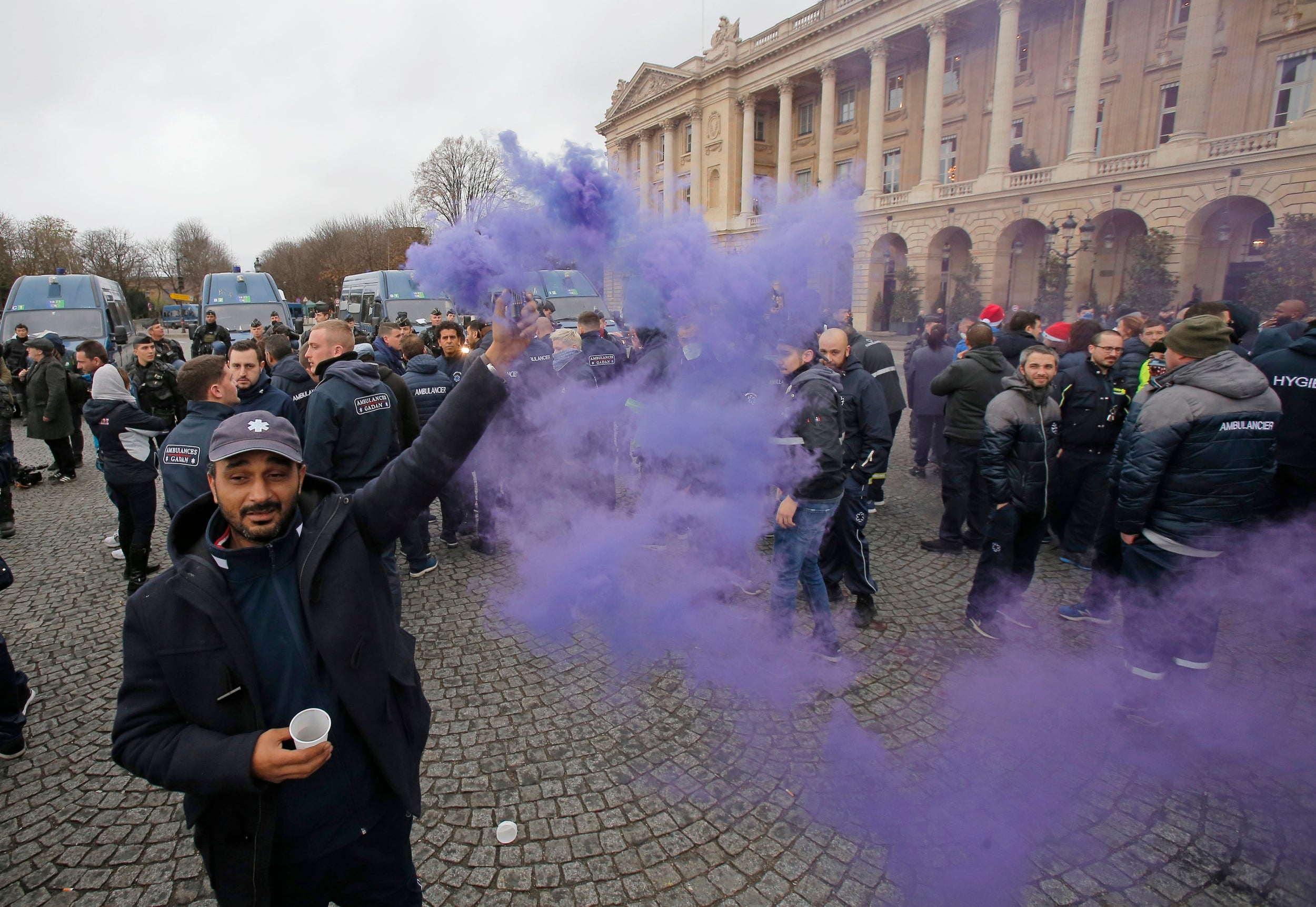President Emmanuel Macron said scenes of “chaos” aren’t representative of the “legitimate anger” roiling France, but refused to answer questions over his response to protests that have left swaths of Paris with burned cars, exploded shop windows and graffiti tags on the Arc de Triomphe.
“What has happened in Paris today is not the pacific expression of a legitimate anger,” Macron said in opening remarks at a press conference at the Group of 20 summit in Buenos Aires. “The culprits of those violent acts don’t want change, don’t seek improvement, they want chaos.” He refused to answer questions on the matter.
Protests by the “Yellow Vests” or “gilets jaunes” movement led to widespread clashes throughout the capital city again on Saturday. Police fired tear gas and using water cannons against demonstrators who set up barricades and tried to approach government buildings.
Prime Minister Edouard Philippe has canceled his trip to a climate conference Poland on Monday. Macron is convening a meeting with Philippe, his interior minister and security forces Sunday morning when he returns from Argentina.
The prime minister said earlier on Saturday that the level of violence was “rarely seen before.” Over 270 people have been arrested and nearly 100 injured, according to the police.
Taxes and More
France’s Interior Ministry said mid-afternoon that 75,000 people were taking part in a third weekend of nationwide protests. The demonstrations began against higher gasoline taxes and have now spread to other demands including cuts to politicians’ salaries.
From Argentina, where local media have widely reported troubles in France, Macron has admitted that the protests at home were a “test (to) the strength of a country, a people, and its government in its ability to keep on its path, without ceding to demagoguery.” Still, the French leader said he wouldn’t respond to questions about the violence during his press conference.
There were reports of violent clashes in Toulouse, Nantes, and Nice, but the worst of the violence was in Paris, where there have been more than 270 arrests Saturday and at least 100 people injured, the Interior Ministry said.
Police and people in yellow vests clashed around the landmark Arc de Triomphe, and on streets leading onto the Champs-Elysees avenue. Police fired tear gas and some protesters set fire to cars and trees, threw cobble stones, and looted some stores and restaurants.
Monument Tagged
A group sprayed graffiti on the iconic monument at the western end of the Champs-Élysées, which houses the tomb of the unknown soldier, where 60 leaders on Nov. 11 commemorated the end of World War I. Later in the day, clashes spread throughout the west of the capital, with burning trash and tear gas near the Opera, in the Tuileries Garden, and on the Rue de Rivoli, favorite areas for tourists and visitors to the city. Some department stores were evacuated.
QuickTake: Why People in Yellow Vests Are Blocking French Roads
Paris Mayor Anne Hidalgo said in a post on Twitter she was “indignant” about the violence, and said “our country is faced with a profound crisis which can only be resolved by dialogue.”
Commentators on television said it’s the most extensive violence in Paris since the May 1968 student uprisings.
Security perimeters were placed around Macron’s Elysee presidential palace and the Matignon residence of the prime minister. Many protesters chanted that Macron should resign.
While police battled protesters at the Arc de Triomphe, the rest of the avenue was largely empty with boarded up shops on what should have been a busy Christmas shopping weekend. Even luxury shops on nearby rue Faubourg St. Honore, where no protests were expected, were closed Saturday and their windows boarded up.
“We had expected trouble and our security services were ready,” government spokesman Benjamin Griveaux said Saturday morning on LCI television. “The troublemakers are a small minority. The government is open to dialogue with those ready for dialogue.”
At a planned meeting on Friday between the movement and the prime minister, only two representatives showed up and one quickly left, saying his request that the meeting be televised live had been rejected.
Many demonstrators in Paris said they felt the police provoked much of the fighting. “I came peacefully, but even I’m ready to fight given how I’ve seen the riot police behave,” said Claude Metayer, a 67-year-old retired army commander, who came to Paris from Pau in the country’s southwest with his 62-year-old wife Eve, a retired teacher. They said they’d seen police allow protesters into confined areas and then not let them out after firing tear gas, and threatening to fire rubber bullets on peaceful protesters.
The grassroots movement has led to sporadic blockades of roads, fuel depots and warehouses. It’s organized through social media and has no leadership, but has the support of three-quarters of the French public, polls show.
The movement’s demands have also expanded to higher pensions, an increase in the minimum wage, a repeal of certain other taxes, the restoration of a wealth tax, a law fixing a maximum salary, and replacing Macron and the National Assembly with a “People’s Assembly.” While political parties have tried to show their support for the movement, the Yellow Vests have rejected any political link.
Jennifer Nogent, a 33-year-old nurse from central France came to Paris for the protests with a fireman and a train driver, all of whom said they’d never been involved in politics before. “The gas taxes were just the final straw,” she said. “The prices of everything are going up: electricity, gas, my insurance.”





